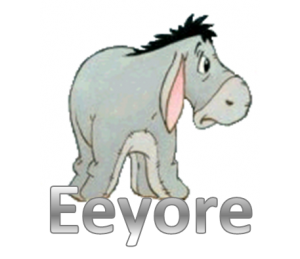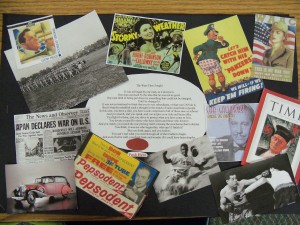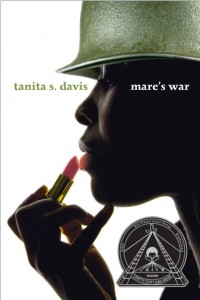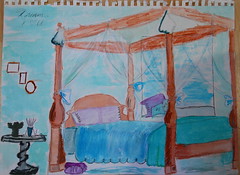THE PHOENIX AGAIN
On the ashes of this nest
Love wove with deathly fire
The phoenix takes its rest
Forgetting all desire.
After the flame, a pause,
After the pain, rebirth.
Obeying nature’s laws
The phoenix goes to earth.
You cannot call it old
You cannot call it young.
No phoenix can be told,
This is the end of the song.
It struggles now alone
Against death and self-doubt,
But underneath the bone
The wings are pushing out.
And one cold starry night
Whatever your belief
The phoenix will take flight
Over the seas of grief
To sing her thrilling song
To stars and waves and sky
For neither old nor young
The phoenix does not die.(originally published in THE SILENCE NOW, by May Sarton, 1988)
This poem is for my friend L. today.
Category: Uncategorized
{that intelligent librarian, Lizzy Burns}
“…ignorance and innocence are not identical…keeping teens from the books that will help them with difficult things under the belief that this makes the difficult things never happen does more damage than good. I’m also of the belief that once it’s decided that certain things should not be spoken aloud — incest, abuse, suicide — and not included in books, it makes it that much harder for those teens who do experience those things in life, either directly or indirectly, and people end up thinking that those people who experience those things should likewise be hidden. Not talked about except in a whisper.”
What are we talking about here? Wellll, the Wall Street Journal has discovered the Breaking News that there are Dark Topics covered in books for children and young adults. And such eeeevil is being force-fed to some imaginary children somewhere, and coarse writers, booksellers, reviewers and publishers – who are okay with bad words, vampires/self-mutilation, and probably child murder – are to blame.
Well, gee.
It seems like every six minutes someone who doesn’t actually read enough sets out to speak to a topic. I know, I know — it happens in schools all the time when students write papers. But, see, they’re not getting paid, they’re merely getting graded, and we’re not a captive audience to their nonsense (and their teachers hopefully can cure them of their bad habits). When someone is getting paid to espouse an opinion in a publication, I do wish they would check facts and try to present a balanced article. Our national conversation is so taken up with inflaming rhetoric that people have ceased to think, and merely hurl invective for entertainment. It’s ugly and unnecessary, so I shall set aside my tendency towards sarcasm and ask you to go and look at Liz’s piece in the School Library Journal about this, read, think and respond. The above quote is going to be on my email for awhile, because I agree strongly: pretending that reality doesn’t exist has never yet changed it.
Here’s to writing about reality, and helping literature continue to be both window and mirror – showing us what other people have survived, or maybe telling us that we, too can survive ourselves.
{poetry friday: S.E. Kiser again. Because he is awesome.}
The Unsubdued
by S.E. Kiser
I have hoped, I have planned, I have striven,
To the will I have added the deed;
The best that was in me I’ve given,
I have prayed, but the gods would not heed.I have dared and reached only disaster,
I have battled and broken my lance;
I am bruised by a pitiless master
That the weak and the timid call Chance.I am old, I am bent, I am cheated
Of all that Youth urged me to win;
But name me not with the defeated,
For tomorrow – again, I begin.
Here’s a another poem to go with THE FIGHTER, my Kiser selection from the other day. I don’t think I’ve known of a 19th century poet other than Whitman who so freely acknowledges failure, writes about it with unvarnished directness, but then says, “go on anyway.”
Hear that, wishers and liars and magic bean buyers? Go on anyway.
Poetry Friday today is hosted by Toby Speed @ The Writer’s Armchair. I love that we get good chairs in this business. Toby’s looks plushy.
{poetry now: The Fighter}
The Fighter
I fight a battle every day
Against discouragement and fear;
Some foe stands always in my way,
The path ahead is never clear!
I must forever be on guard
Against the doubts that skulk along;
I get ahead by fighting hard,
But fighting keeps my spirit strong.
I hear the croakings of Despair,
The dark predictions of the weak;
I find myself pursued by Care,
No matter what the end I seek;
My victories are small and few,
It matters not how hard I strive;
Each day the fight begins anew,
But fighting keeps my hopes alive.
My dreams are spoiled by circumstance,
My plans are wrecked by Fate or Luck;
Some hour, perhaps, will bring my chance,
But that great hour has never struck;
My progress has been slow and hard,
I’ve had to climb and crawl and swim,
Fighting for every stubborn yard,
But I have kept in fighting trim.
I have to fight my doubts away,
And be on guard against my fears;
The feeble croaking of Dismay
Has been familiar through the years;
My dearest plans keep going wrong,
Events combine to thwart my will,
But fighting keeps my spirit strong,
And I am undefeated still!
~ S.E. Kiser (1862 – 1942)
Samuel Ellsworth Kiser was born in Shippenville, Pa. He began newspaper work in Cleveland, and from 1900 until 1914 was editorial and special writer for the Chicago Record-Herald. He’s one of those widely syndicated, often-repeated old poets that I’d never heard of until this week, and now I want to find everything he’s ever written.
Keep fighting. Stay strong. Your life may feel like a mess right now, but there WILL be an end to this part.
{“thanks for noticing me.”}
“Good morning, Pooh Bear,” said Eeyore gloomily. “If it is a good morning,” he said. “Which I doubt,” said he.
“Why, what’s the matter?”
“Nothing, Pooh Bear, nothing. We can’t all, and some of us don’t. That’s all there is to it.”
“Can’t all what?” said Pooh, rubbing his nose.
“Gaiety. Song-and-dance. Here we go round the mulberry bush.”
“Oh!” said Pooh. He thought for a long time, and then asked, “What mulberry bush is that?”
– Winnie the Pooh, by A. A. Milne
Poor Eeyore. His conversation with Pooh just illustrates the weird conversations a depressed person can have with those who don’t get us. (Of course, Eeyore is being somewhat cryptic, but still.) Tons of people love Eeyore, though, despite his habit of seeing the absolute worst in everything, from thistles to aggressively sanguine tigers. He’s moody, grumpy, and generally a melancholy downer — yet the pink ribbon on his tail reminds us that he doesn’t see himself as depressed. Sometimes there are within him flashes of joy.
Today, the character of Eeyore is 140 years old – probably feeling creaky-old and somewhat down, but he’s still my favorite character in the Hundred Acre Wood, after the timid and tongued-tied Roo. But the question of why we actually like what is essentially a depressive donkey is explored today on the Guardian Books Blog. Says the author, “But the key thing that makes Eeyore a great character is that essential literary ingredient: conflict. Eeyore is profoundly conflicted. He craves love – indeed, he’s always lamenting his outsider status – but he struggles to give and receive it. When it’s offered to him, he puts out his hoof and waves it away.” Eeyore is all of us — every one of us, trying to keep our balance and our tails, in a wood populated by hyperactive tigers, bears of very little brain, annoyingly smart owls, and hideously callous and impatient rabbits.
My friend Shawn and I used to have amusing conversations about depression. I think it’s almost harder for guys to be depressed – girls are kind of expected to have at least monthly visits into bad moods, but when a guy is suffering from depression, it seems harder for people to understand. But, what is there to understand? A chemical imbalance in the brain throws a switch and says, “There. You’re sad now.” And that’s that. Some types of depression don’t have to be about anything. And those are the most frustrating kinds, when everything that’s actually wrong is magnified by five thousand percent. And at those times, the Eeyore among us really need our compassion and patience – and sometimes just our presence.
Today, in honor of Eeyore’s birthday, eat your thistles, hang onto your tails, and remember there’s room for all of us in the Hundred Acre Woods, even the loners who are depressive and grumpy. Love us anyway.
{Blog Brilliance}
Yat Yee Chong is one of the most careful, meticulous, polished and thoughtful writers I’ve read, and that’s only for her ADULT work. She’s sallying forth into writing MG and YA fiction, and I’m privileged to read along with her as she gets into it. Her blog post today on juxtaposition gets full marks for creatively applying current events to writing. Some smart stuff.
Lots of other great things is going on in the blogosphere – Gregory K. Pincus has reached his Kickstarter goal to raise funds to visit (virtually or in person) 40 schools through next school year, and there’s one week left of his original Kickstarter term. In the next seven days, if he can raise an additional $500, that’s five more schools with a poet-in-the-classroom visit — free. I am always so proud to be involved with the amazing and dedicated people of the kidlitosphere. I really am.
In other utterly brilliant news, Guys Lit Wire is kicking off their Book Fair again! Last year we donated some 772 books – their entire wish list – to Ojo Encino Day School in the Navajo Nation, and Alchesay High School, on the White Mountain Apache Reservation. This year, the focus school is in our nation’s capitol.
You’d think being in D.C. would mean that a school was well-staffed, well built, and primed to turn out America’s finest scholars. Yeah. You’d think that. I was a little shocked at what I saw of Washington D.C. when I went to the ALA Convention last summer. That inner city poverty thing is alive and well. Why is GLW interested in D.C.? Because Ballou Senior High School – a school with over 1,200 students – has 1,150 books in their library. Not even enough books for every student to read one. And you know many of those are dictionaries, reference books, and the like. But, the D.C. district isn’t a state – it has no representative in the House or the Senate, recall. If there’s nobody beating the drum to care about kids and literacy, they’re not getting anything other than the bare minimum. Emphasis on “bare.” Which is the exact description of their library bookshelves.
Fortunately, there’s you. And me. And the Guys Lit Wire Book Fair. As happens every year, the librarian at the school is polite, but slightly skeptical, afraid that nothing WILL happen. Other people have tried to help, given well-meaning stacks of books – in duplicate – without asking what the students readers want and need. Guys Lit Wire is different; we’ve asked. And the list is up.
– from organizer Colleen: “For those of you who have been with us before, the drill is the same. Go to the Powells web site. In the upper right you can click on “wish list”. On the next page you will be asked to enter the email address for the friend’s list you are looking for (you might need to scroll down a wee bit to see this prompt.) Enter our email: guyslitwire@gmail.com”
There are 900 books on that school’s wishlist. Already, people want to give that many, and more. Read the rest of the Fair details, and see the video of the school’s EMPTY SHELVES @ Guys Lit Wire.
There’s an idea floating through the world that very smart people are sometimes very close to the edge of sanity — as if the brighter the light, the faster it burns out. Equally common is the idea that creative people are all a little weird. What if you don’t feel like you’re a little weird, but you kind of hope that you’re creative? Should you become weirder, in order to be creative, or do you maybe just not recognize your own weirdness? This is a thought-provoking little piece I found via Lit Drift.
And speaking of insane and eccentric – it’s National Mental Health month. I made a little logo for it – don’t know what I’m going to use it for (and wp keeps dying every time I upload it; guess I’ll share it later), but I like the concept of the tagline I’ve come up with: Live out loud. Way back in 1949, Congress designated May as Mental Health Month because they felt it was important to get the word out about what mental health is, and how to preserve our health. I think it’s also important to celebrate our mental health, and the strides we’ve taken as a world in not throwing people with mental challenges away – and we have made strides, haven’t we? (At least some?) One in four people in America have a diagnosable, treatable mental illness, and yet there’s still such stigma and shame about the weird chemical things our brains do without our consent. It’s time to stop the shame, and start the education. More on this thought later in the month.
Happy First Monday in May.
{Poetry Friday: Oakwood Grade 6 Poetry Project III}
Felicitations, this fourth day of the Omer, smack in the middle of Passover, and the opening act of the three-part Easter celebration for all of my Jewish and Christian peeps. If none of those celebrations is for you, it’s also Earth Day, wherein we celebrate the dirt and the trees and the nematodes, and the things from the natural world which sustain us, and try not to mess it up any further. Still not enough of a party? Right – it’s also still National Poetry Month, which means you’re in the right place for a poem.
It’s probably a little quiet around the blogosphere today, but poetry is still out there all over the place. I checked this morning that The Great Gregory K’s Kickstarter Poetry: Spread the Word is 76% funded, with seventeen days left. Read today’s poem for his 30 Poets, 30 Days celebration – and consider of all the reasons why it’s really important to keep poetry programs going in schools across the states — and then, give what you can. Thanks!
Last week, our young poets were ladies who have made friends with their vocabularies. They painted word pictures of Mare and really nailed some of her best attributes as a teen and as an adult. Today our poet is Zack, whose collage is filled with pictures depicting the time period of MARE’S WAR — but with a focus on war. As before, the poems are copyrighted to the individual poets, which is why they are only being shared as-is on their collage sheets — please respect the integrity of the poets, and do not reprint these ANYWHERE without their permission. Thanks.
You might think that a poem about war is not exactly a poem that fits MARE’S WAR, but it matches perfectly. There were two wars discussed in the novel – the World War II conflict, and the war that the African American soldiers fought for respect and equality within the military and within their nation. Zack takes the time to look at the background conflicts that prefaced MARE’S WAR from a variety of ways. Without naming names or positions, he clearly observes the grievances of the Axis nations, its charismatic leadership, and its eventual plunge into conflict. He then seems to turn to more personal reflections on disputes and how fighters struggle to make peace.
It’s a surprising irony that the things that start screaming fights among classmates can be the same things that start a war. Zack remarks on this with the opening lines:
It was all began by one man, as it always is./ One man incensed by the idea that he was not as good./ One man tired of being put down by something that could not be changed./ Until he changed it.
Just like that, we have the set up for a disenfranchised people coming together with a grievance, and demanding something happen. In MARE’S WAR, the Axis nations felt put upon and Germany felt cheated by WWI sanctions against them, leaving them an impoverished and bitter nation. One German leader who could stand up and make a difference for his people chose to do so. Too bad he made so many other poor – murderous, and downright evil – choices along the way.
My favorite lines are about the futility of conflict: And you watch, you watch the war prolong itself, missing the conclusion that it desires./ You think, it was me who began this, why can’t I finish it? Conflict, bad feelings, and war is like a ball rolling downhill. Once it picks up speed, there is often no stopping it.
This is a serious poem with a grim topic, but I’m grateful that Zack shared it with us, and did some deep thinking on a subject which affects us all.
There’s one more week of National Poetry Month, and yet more poetry at The Book Aunt, who is hosting today. Happy Poetry Friday, Happy Earth Day, Happy Pesach, Happy Easter, and Joyous Spring.
{meanwhile, while not speaking HERE…}
I’m going to be featured tomorrow at Capillya Uptergrove’s “Cover Love” series at That Cover Girl. Today Capillya talks about her love for the new cover of Mare’s War, and tomorrow, I’m going to talk about it, with my cover designer from Knopf/Random House.
Yep. It is still six kinds of striking, isn’t it?
If you haven’t browsed Capillya’s blog yet, she’s new to the scene, and yet her slightly snarky, offbeat YA book cover blog is quality, if not yet quantity. Check her out.
Sorry I can’t stick around – catching up on some writing. I started a NEW NOVEL while I had company. Yes, you may ask: WHY DID I DO THAT when I’m in the middle of revision on my SFF!?! Dunno… just the way my brain works.
On the other hand, all the Cool Kids are doing it; that’s how Lainey Taylor came up with Daughter of Smoke and Bone, which is going to be in bookstores shortly. Anyway – I’m excited about the new-new story, but also in dire need of catching up with my revision, as I have a date with a freelance editor at the end of April — and I’m not even halfway finished. Oops.
So, gotta go… Here. Have a pigeon. It’ll make you feel better.
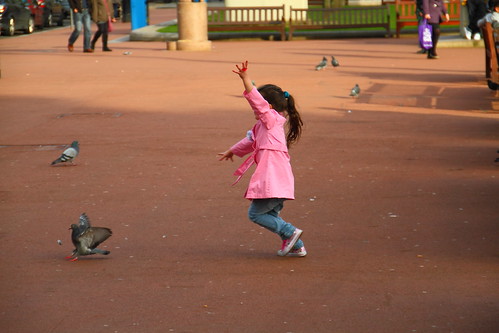
Girl: “Pigeon! I will LOVE you and SQUEEZE you and NEEEEEVER let you go!”
Pigeon: “Aaaaaaaah! Pink human! Pink HUMAN!!!!”
Hope you, too, have fabulous bright rainwear, and don’t forget to check out That Cover Girl tomorrow. Happy week!
{little discoveries}
Little corners of Edinburgh always reveal such nice things. I’d seen this sign before, but hadn’t had time to stop in to the tiny museum full of Robert Lewis Stevenson and Robert Burns memorabilia, until my brother and niece came to visit.
Please note the blue sky. It was 46°F, but the sky. was. blue.
Lots of stories to tell, a few small happenings to relate, but — too tired to talk, after a week of guests. I expect to get my second wind soon!
Happy Weekend. May the sun shine at least for a little while.
{living in color}
Every time I am tempted to think that we are, as a human species, somehow inching up the ladder of microevolution and becoming better and brighter and stronger, something like the recent disasters in New Zealand and Japan occur, and the talking heads get started. Utterly horrifying to me are the alleged — and largely American — Christians who say that whatever fresh horror is somehow a karmic flashback on the Japanese people – though how Christians got involved with karma, which is strictly a fundamental doctrine in Buddhism and Hinduism, I have zero idea. Further mortifying humans with compassion, taste, and a sense of propriety are the people who can make jokes about the hundreds dead and still dying.
When I ask myself how it is that people can be so …basically wretched, the thought comes that our utter disregard for each other based on the usual suspects, ignorance and fear. Those are the key components to racism, and they poison so much of what we do. Sometimes I think we’re actually pretty wired toward racism, just with the way our language is formed.
(Maybe you’ll think this is reaching, but bear with me, please. This is one of those posts where I’m mostly thinking aloud. I have come to no solid conclusions, these are just — suppositions. Feel free to share your own.)
When I was a kid, I really hated that at church, dark or black was sin, and white was all good and God and righteousness. As a matter of fact, I purposefully referred to myself as “brown” to avoid the larger religious implications of not being washed “whiter than snow;” after all, brown wasn’t really specifically mentioned in Holy Writ! As a larger kid masquerading as an adult, I mostly understand why the dark/light/black/white thing came about, but I think it’s also prejudicial, in many ways, and that just like people have reconfigured versions of the religious writings to use less gender-divided language, it might be nice for people to take a look at limiting the use of black/white imagery to depict bad and good. On the other hand… it might not be possible to change some fundamental elements of how we think about color.
Alan Kennedy’s nifty Color/Language Project takes color idioms from myriad languages around the world, and explores what they mean. In English, someone who is green is either a.) inexperienced, b.) envious, or c.) environmentally conscious. In all kinds of languages, some colors are still a negative — take a look at just a few examples:
In Hindi, to place a black pot on the head is to bring disgrace on oneself; in Mandarin, a black pot on the back is to be scapegoated. Black work, in German, is to be working illegally. Black riding, in Dutch, is to ride public transportation without paying. For Swedes, the black disease is jealousy, for Norwegians, the black takes you when you go to hell, and in Japanese, to be black-bellied is to be deceitful. To make someone brown, in French, is to cheat them; brown doctors or lawyers are quacks, or crooked. In Spanish, to eat the brown is to be given unfair work, or blame. In Portuguese, a yellow smile is a fake smile, and in Russian a yellow house is an insane asylum. We can’t forget red’s association with anger, Communism, debt, or, in Spanish and Welsh, adult films (!). Colors are viewed pejoratively, and in some ways, the people whose ethnic background is tied to color words can be painted with that same pejorative brush.
I love language, and I am not at all suggesting that these color words shouldn’t be used or should somehow be changed or ignored. I am merely wondering if we aren’t maybe even more inclined to think badly of others, based on some of the color idioms in our speech. Yes, it’s specious to say that we don’t “see” color in this world, and color and ethnicity definitely adds richness and depth to our world — but I’m not sure that how we talk about it is working. Maybe we should stop with all the “red, and yellow, black and white,” and just think humans. And go on from there…
(Thoughts? Obviously, this is just a fragment of an idea, but it was ping-ponging around in my head, and now that it’s out, I hope I can get some work done…!)
Hat tip to Nancy Friedman at the quirky naming blog, Fritinancy, for the link to Alex Kennedy’s project. Yes, that’s Frit·i·nan·cy n. [From the Latin fritinnire, to twitter.] A chirping or creaking, as of a cricket. – Is that not the coolest blog name, EVER? That’s totally what they should have called Twitter. (This is why NANCY has the naming blog, and I don’t.)

